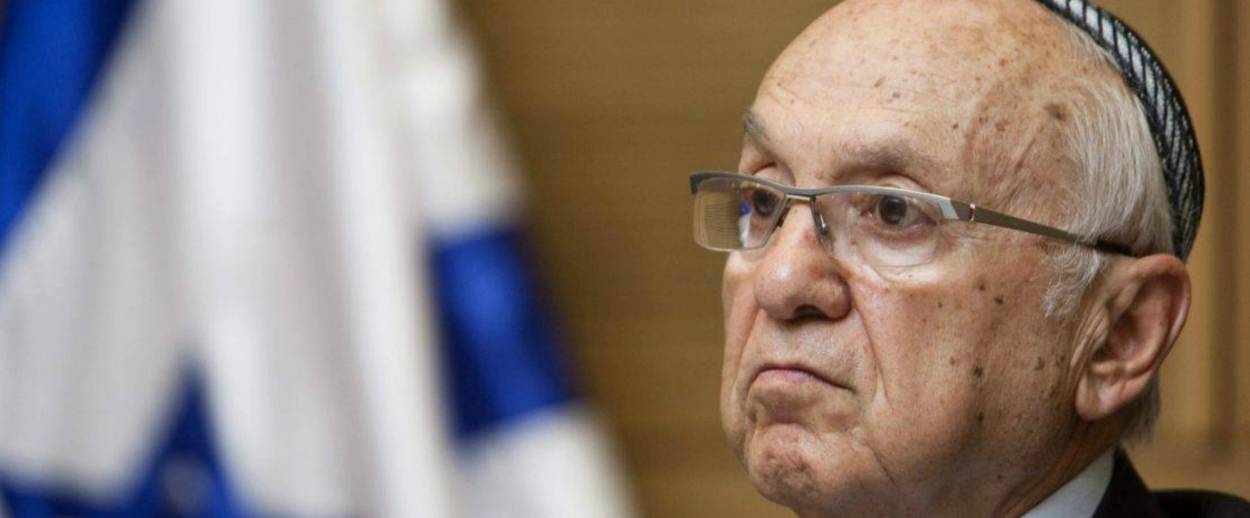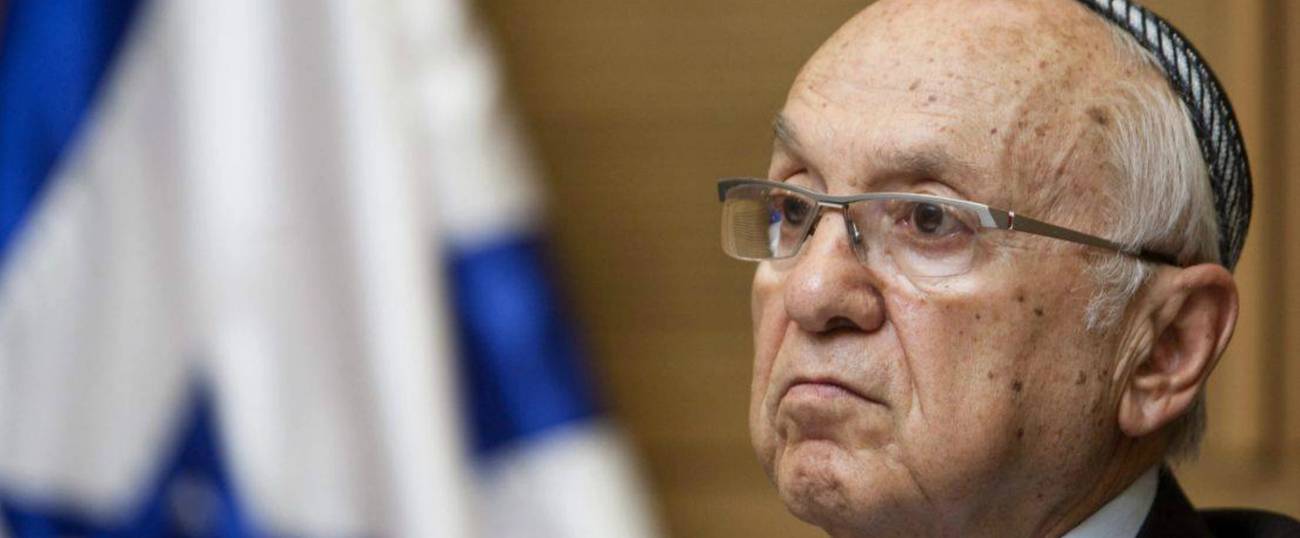A Tribute to Yaakov Ne’eman
Remembering the life of my friend and colleague—a professor and attorney who served as Israeli’s Justice and Finance Minister




As Hanukkah faded away at the end of the eighth day of the holiday, Yaakov Ne’eman, a special figure in the Israeli public life and the legal arena for over four decades, returned his soul to the Almighty. He passed away on New Years Day surrounded by a beautiful family—he and his wife Hadassah have 6 children and 32 grandchildren. Many friends, including President Reuven Rivlin, accompanied him during his last months, weeks, and days. He knew, on a personal level, how to be a friend. He was my friend and a friend of many. To me, the most moving part of his funeral eulogies, besides the ones given by his children, was a short eulogy by Yaakov Avitan, the father of Adi, a soldier kidnapped and killed by Hizballah in 2000, whose body was returned in 2004. Mr. Avitan spoke about how Ne’eman reached out his warm hand to him and to the families of the other kidnapped soldiers, throughout their agony, and about their full confidence in him along those bitter days.
Ne’eman, a scion of a rabbinical family from Hungary, named after his great-grandfather Rabbi Yaakov Paneth, made his public name as a prominent lawyer, an adviser to Prime Ministers, and a Minister of Finance and Justice. His career began as a young man, a hard-working lawyer and legal scholar. This was when I first met him, 50 years ago, as his student in contract law and tax law, which he taught in the Tel-Aviv branch of the Hebrew University of Jerusalem’s Law School. As a teacher he was knowledgeable and lively; a short, jumpy, and friendly young scholar. Later on our paths crossed, time and again, mainly in Israel’s government service. Professor Ne’eman dedicated quite a number of years to senior government positions, as Director-General of the Ministry of Finance (1979-1981), Minister of Justice (1996 and 2009-2013), and Minister of Finance (1997-1998).
Ne’eman had endless energies, which enabled him to live an amazing lifetime of activities, combining a successful legal career, public prominence, love of Torah and a deep involvement in charity and chesed, and happy family life. There were also controversies along the road, which he faced in a cool manner. He was a focused no-nonsense person, highly efficient, and a smart fighter. After his military service, which was connected in reserve with identifying fallen soldiers’ bodies during war operations, Neeman indulged into an academic career, as one of the founders of the Bar-Ilan Jacob Herzog Law School in the early ’70s, and as a young professor of tax law, his early specialty, emanating from his work with Supreme Court Justice Alfred Witkon, a founding father of the Israeli tax law.
But Ne’eman had further plans. In the early ’70s he also became a founding partner in what became a major commercial law firm in Israel—Herzog, Fox, and Ne’eman. Chaim Herzog, a former general and the father of the current opposition leader in the Knesset Yitzhak “Bougie” Herzog, later became the President of Israel. Michael Fox was a prominent jurist, originating from Britain. Ne’eman was the Israeli law leg of the three founders, and soon became a well-known dealmaker, litigator, and arbitrator, acquiring clients like the late Abba Eban, who had a tax problem; Ne’eman helped him close the file.
From 1979- to 1981 Ne’eman became Director-General of the Ministry of Finance under Minister Yigal Hurwitz, his first major public role. I remember him in those days, when I served as an assistant to the Minister of Foreign Affairs. It was not an easy period, mainly internally, but it opened him to international financial circles. During the next 15 years he served besides his professional work, on various committees of importance. But his prominent period in the Israeli public life began in 1996, when he was appointed Minister of Justice in Benjamin Netanyahu’s first government. As it turned out, the position was short-term. Two months after his appointment, he was indicted by the Attorney General on submitting a false affidavit years earlier. Ne’eman resigned as soon as the investigation began, and was later acquitted by the Tel-Aviv District Court in May 1997. The Court believed that he had acted innocently; however, the whole event must have left a scar on him.
In 1997, Ne’eman came back to government in two different capacities. First, upon my recommendation (as Attorney General), he became chairman of a committee tasked with developing solutions to conversion issues, a matter which is always on Israel’s political and judicial agenda. His committee’s recommendations, which I strongly supported, resembled recommendations I had tried to coordinate in 1988-1989, following the “Who is a Jew” conflict after the 1988 elections in Israel. The effort then included a number of leaders—Rabbis Norman Lamm and Louis Bernstein (Orthodox), Ismar Schorsch and Shamma Friedman (Conservative) and Alfred Gottschalk and Walter Jacob (Reform), as well as a representative of the Chief Rabbinate. We came close to a solution, but it was aborted. The Ne’eman committee recommendations were supported by Orthodox, Conservative, and Reform leaders, but opposed by the Chief Rabbinate, a part of the Haredi trend, and some members of the Reform movement. The idea was simple: a joint institute aimed at preparing candidates for conversion, its board of directors comprised of five Orthodox representatives, one Conservative and one Reform. But the conversion itself was to be done in a Beit Din, therefore recognized by the Chief Rabbinate of Israel. I should note that the legal adviser to the committee was Noam Sohlberg, then my assistant and now a Supreme Court Justice. Despite the Chief Rabbinate’s opposition (which later softened), the government adopted the recommendations but the issue never reached legislation. It is, in my view, a pity, and I repeated this opinion in a recent court case.
In 1997 Ne’eman also became the Minister of Finance, a task that he fulfilled until the end of 1998. The life of a Minister of Finance in Israel is never easy, and Ne’eman “ran the show” cool-headed. There were conflicts with the Histadrut (trade unions), and there were budgetary fights. I vividly remember that he added a very substantial number of probation officers after State Attorney Edna Arbel and I had made the request, which reflected his social awareness. As Attorney general, I enjoyed full cooperation with him; despite being a prominent lawyer with his own legal views, he unequivocally accepted my professional opinions, even when he personally may have thought otherwise. When privatization of Mekorot, the governmental water corporation, was suggested, I strongly opposed it, arguing that “you do not sell your mother.” He consented to my view.
Upon returning to private practice in 1999 he continued his membership in various committees. It was public knowledge that he advised prime ministers and other ministers on sensitive matters, including their personal problems, to which I am not privy. He would always quote the Talmudic passage “blessing is only in matters remote from the eye” (Bavli, Ta’anit 8, 2). But he was also a litigator, fighting over the years for some of the more delicate cases, and many a time winning. For example, he persuaded the Supreme Court to enable bereaved families of fallen soldiers to add a special personal text to the military tombstones. At the time, as General Counsel to the Ministry of Defense, I had tried to somewhat change the practice which kept a universal unified stone, but the Advisory Council at the Ministry of Defense, consisting mainly of bereaved families, opposed. Ne’eman won the case in the courtroom.
When I, again as Attorney General, opposed Prime Minister Ariel Sharon’s intent to appoint his son Omri as a special emissary to our neighbors, arguing that this would smell of third-world-type nepotism, I agreed that Ne’eman, whom Sharon picked, would represent him in the Supreme Court. As a rule, ministers are represented by the state attorney, but since it involved Sharon’s son, I affirmed Ne’eman’s appearance, opposing my view. The Supreme Court suggested a compromise, by which my approval will be needed for each travel made by Omri. It didn’t last long, and Sharon found other emissaries, government employees. Ne’eman served for many years as a chairman of the Bar-Ilan University managing board, thereby completing a circle that began when he was a young teacher there; our paths crossed again when the university granted me an honorary degree.
In 2009 Ne’eman was again appointed Minister of Justice under Prime Minister Netanyahu. He was successful in brokering the appointment of seven Supreme Court Justices. However, his initiative to split the position of the Attorney General between the head of prosecution and the legal adviser to the government, which was against the long-time Israeli tradition, did not succeed. I myself publicly opposed it. Ne’eman also advocated giving more prominence to Jewish law in Israeli jurisprudence. (I also believe we should make use of the treasures of Jewish law, a national and cultural asset.)
Upon leaving the government in 2013 for the last time, Ne’eman began a period of semi-retirement during which he dedicated much time to Torah learning. We shared classes with Chief Rabbi Shlomo Amar, to which he came devotedly. Interestingly, for many years he would spend the days between Rosh Hashanah and Yom Kippur in a Zionist yeshiva. He recently prepared a memoir, which appeared a day before his death at his home in Jerusalem; in the past he resided in the Old City.
The model that Ne’eman represented, of both a prominent lawyer and public figure, has been followed by some others, although the American “revolving door” system is less common in Israel, where we try to follow the British civil service model, which I support; but Ne’eman did it in a smart and serious way. With his loss, a lover of Israel, a great lawyer, and above all a great personality has gone.
May his memory be a blessing.
Elyakim Rubinstein is the Deputy President of the Supreme Court of Israel. He previously served as the Attorney General of Israel from 1997 to 2004.